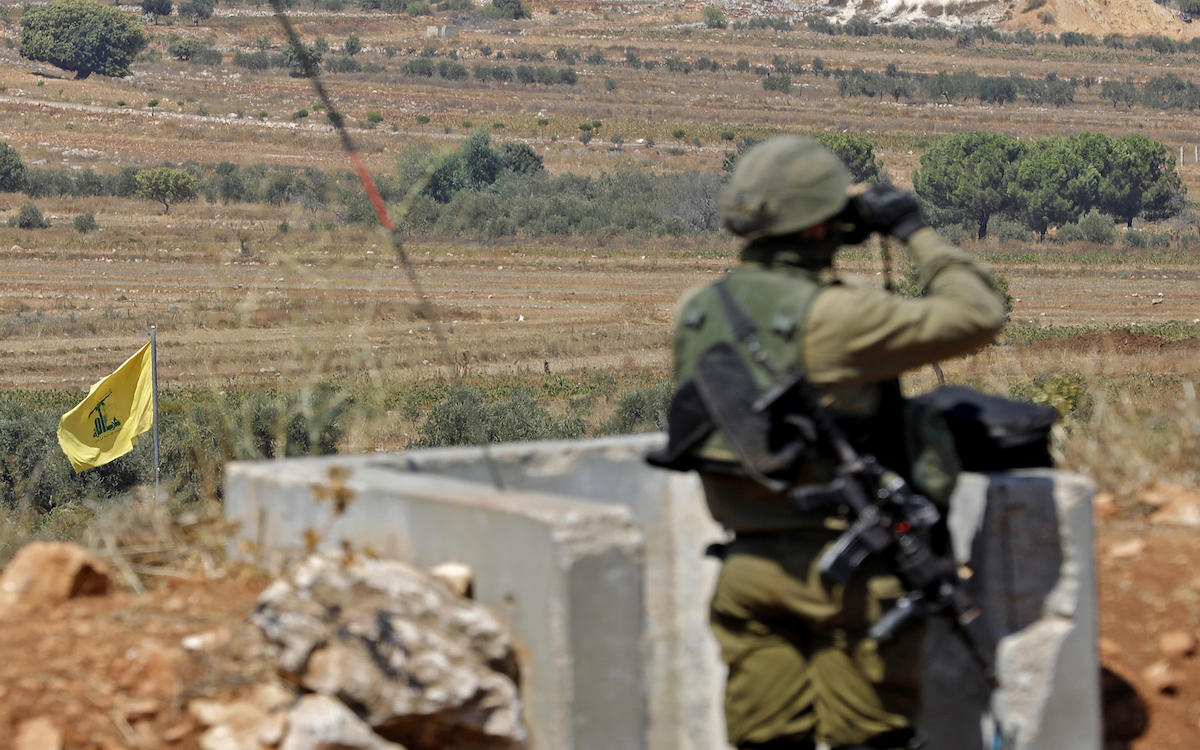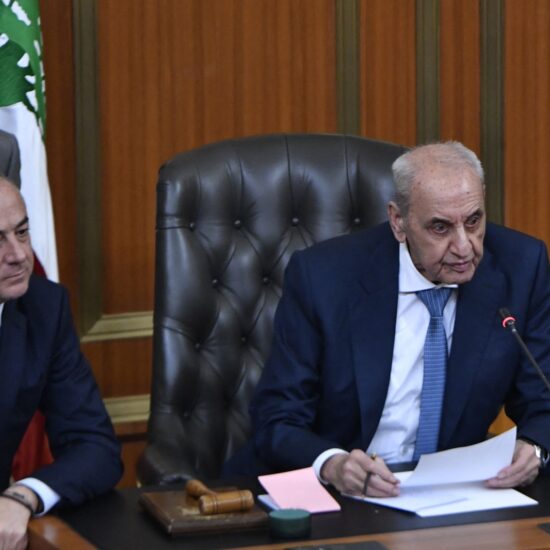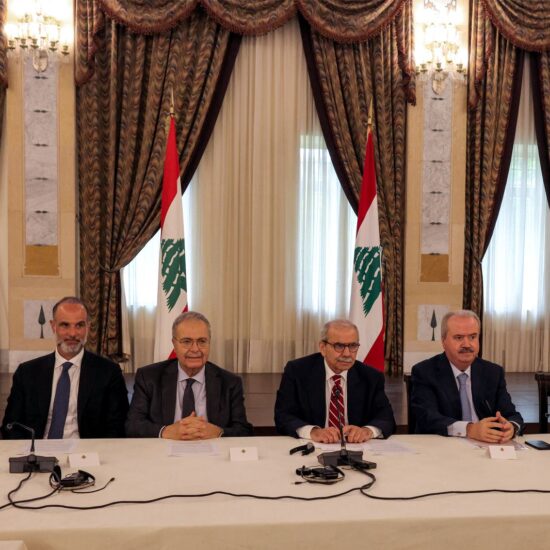
On July 6, a rocket was fired from southern Lebanon at northern Israel. Israel retaliated by bombing the area where the rocket was reportedly launched from in Kfar Chouba.
A single rocket was believed to have been fired from South #Lebanon into northern #Israel a little bit ago. However, Israel denies that any missile was fired and no one has taken credit yet. There were two explosions recorded this morning: one by Ghajar and another by Chebaa.
— Nicholas Frakes | نيكولاس فريكس (@nicfrakesjourno) July 6, 2023
This came at a time of heightened tensions along Lebanon’s southern border.
The escalations started when Hezbollah erected military tents in Kfar Chouba, in response to Israel’s attempts to bulldoze the area. Israel also annexed the village of Ghajar after they put up a wall around the village.
In addition to the Shebaa farms, Lebanon claims the villages of Kfar Chouba and Ghajar as being occupied by Israel.
A UN representative is set to come to Lebanon soon in the hopes of finding a solution for the situation on the country’s southern border.
The representative, who is reportedly American, will seek a meeting with Hezbollah’s secretary-general, Hassan Nasrallah, to discuss the party’s position surrounding the disputed territories, as well as present ideas from the UN about South Lebanon.
Nasrallah will likely claim Shebaa, Kfar Chouba, and Ghajar as Lebanese territories and insist to the UN that Israel should be forced to withdraw from them. Given the far-right and extreme nature of the current government in Israel, this is highly unlikely to happen.
Given that the UN will be unlikely to accomplish anything significant, tensions will almost undoubtedly remain high.
Israel, given its history, will not return the UN-recognized Lebanese section of Ghajar unless it has absolutely no other choice, and Hezbollah will use this as part of its messaging to its support base to further justify the need for Hezbollah and its arms.
All the while, as Hezbollah and Israel poke at each other, Lebanon remains without a president.
Little to no movement has been made on the issue and it seems unlikely that there will be any changes to that soon.
The politicians have mostly turned their attention away to other things rather than continuing to focus on one of the biggest issues affecting Lebanon, more than happy to let the international community solve their problems for them.
In Hezbollah’s case, its gaze shifted from Baabda to the south.
In Lebanon
Another meeting: Qatar called for another five-nation meeting on Thursday to discuss the continued political crisis plaguing Lebanon through the inability to elect a president.
While the date of the meeting, tentatively scheduled for July 13, there has already been a request to postpone the meeting until July 17.
France, on the other hand, is looking to see what Le Drian is able to accomplish in the next few months and pushing for the meeting to be scheduled in September. This, however, will likely depend on what the Saudis and French are able to agree on.
While there has been some international movement in trying to help break the stalemate in Lebanon and get a president elected, all proposals so far have fallen flat and have been rejected.
Forgetting the past: Former President Michel Aoun decided to comment on the current situation in Lebanon last week on Twitter where he stated that if he were part of the ruling elite today, then he would have “submitted his resignation” due to the “violations that are taking place” and “negligence against the Lebanese people.” He also added that he has “never been in their place” and he will not be.
لو كنت مكان المنظومة الحاكمة اليوم وفي ظل كل الارتكابات التي تحصل والتقصير بحق الشعب اللبناني، لكنت تقدّمت باستقالتي… ولكن لم أكن يوماً مكانها ولن أكون
— General Michel Aoun (@General_Aoun) July 5, 2023
These statements quickly garnered online ridicule from many Lebanese who pointed out that he had just ended his six-year term as president less than a year ago; meaning that not only was he part of this ruling elite that he is rallying against, but was, technically, the head of it.
Others pointed out that the Lebanese people had called on him to resign for the very reasons he stated back in 2019, during the popular uprisings, and he refused to do so.
In the meantime, 252 days after Aoun left office, Lebanon remains without a president.
Shooting in Bekaa: One person was killed and three more injured in the Bekaa on July 7, when a man opened fire on people near a mosque in the area.
According to an army statement, the shooting took place in Bar Elias.
The shooter was injured during his arrest by security forces. He died as a result of his injuries the following day.
This shooting marks another in a growing list of violent crimes as Lebanon continues to grapple with the economic crisis that has bred economic and social instability throughout the country.
Frozen: A French court has upheld a decision to freeze Lebanese Central Bank Governor Riad Salameh’s assets after the BDL head filed an appeal to have them released.
The embattled Salameh had an estimated $130 million in assets frozen in March 2022 by France, Germany, and Luxembourg as part of their investigations into his alleged financial crimes.
France and Germany have both issued arrest warrants for Salameh after he refused to cooperate with the investigation and appear for questioning.
Salameh continues to maintain his innocence.
Threats: Deputy heads of BDL have threatened to resign their posts if a new governor is not appointed before the end of the month when Salameh’s term comes to an end according to a statement that they jointly issued.
There is currently no successor named to take Salameh’s place after he leaves office, but the first deputy governor, Wassim Mansouri, is said to be the one who would temporarily take over until a Maronite could be appointed to the role.
Stalling to replace the head of BDL could lead to a severe worsening of the economic crisis.
This statement could see an agreement to extend Salameh’s term as BDL head since it is technically not possible to elect a new BDL chief without a president in Lebanon to sign off on the appointment. The current government is only acting in a caretaker capacity, therefore, it arguably does not have the authority to legally make appointments.
Attack: Caretaker Education Minister Abbas Halabi‘s convoy was attacked by a group of youths while he was visiting the Shakib Arslan public school in Beirut during the first day of the national official exams.
In the videos that circulated on social media of the incident, a group of young people are seen kicking and throwing objects at a vehicle with tinted windows to the applause of onlookers.
One of the attackers is reportedly a member of the General Union of Students in Lebanon, who stated that he attacked the convoy because of the Education Ministry’s “policies that undermine public education.”
The Education Ministry stated that four young men were protesting in front of the school “claiming that the tests were unfair, in order to grab attention.”
Public school teachers went on strike for several weeks earlier this year to protest working conditions and low salaries, disrupting public students’ access to uninterrupted education.
Bank hold-ups return: A man in Beirut held up a bank on July 10 to demand his trapped savings – a return to a tactic that was used by over a dozen depositors in the last year.
Omar al-Awar stormed a Beirut branch of BML where he held the manager hostage until his $6,500 in savings was released to him.
According to the Depositors’ Outcry group, he received the money.
Al-Awar is currently being held at the Bachoura police station, where he is calling on other depositors to come and support him.
In the region
The siege comes to an end: After two days, Israeli troops pulled out of the Jenin refugee camp in the north of the West Bank, leaving behind 12 dead and around 100 injured.
The raid on the camp was one of the largest Israeli military operations in years and saw intense fighting in the streets of Jenin.
This raid was an attempt by the Israelis to “mow the grass” as they say, and temporarily put a stop to Palestinian militant activity in the area.
However, many Palestinians have been quick to point out that this will likely do little to nothing, and that the Israelis will probably return soon.
Acquitted: An Israeli police officer who shot and killed an autistic Palestinian was cleared of all wrongdoing by an Israeli court last Thursday.
The officer, whose name has been withheld, killed Iyad al-Hallaq in May 2020 in Jerusalem’s Old City.
The court ruled that what the officer did was an “honest mistake” despite al-Hallaq’s teacher being present at the killing, where she yelled at the police in Hebrew that al-Hallaq was disabled and posed no threat.
Itamar Ben Gvir, Israel’s national security minister, was seen in a video telling al-Hallaq’s mother “get out of here you terrorist.”
Horrible!
“Get out of here, you terrorist,” said Israeli minister of security Itamar Ben-Gvir, to the mother of a Palestinian autistic boy who was shot dead intentionally by Israeli forces.Yesterday, an Israeli court acquitted the killer of all charges after fully endorsing… pic.twitter.com/JsMq35ow7Q
— Ramy Abdu| رامي عبده (@RamAbdu) July 7, 2023
Seizure: The US Navy said that Iran attempted to seize two oil tankers in the Strait of Hormuz on Thursday and even opened fire on one of them.
The Navy added that once the US dispatched boats to the area, the Iranian vessels backed off.
Iran has seized at least five tankers in the last two years and has continued to harass many others.
These vessels are then often used as bargaining chips in future negotiations.
Kidnapped: Russian-Israeli scholar Elizabeth Tsurkov was reportedly kidnapped earlier this year while on a work trip to Iraq.
#Israel PM Benjamin #Netanyahu says that Israeli-Russian scholar @Elizrael was kidnapped several months ago in #Iraq and is reportedly currently being held by Kataeb Hezbollah. #إسرائيل #العراق #نتنياهو
— Nicholas Frakes | نيكولاس فريكس (@nicfrakesjourno) July 5, 2023
While she was kidnapped around four months ago, it was only made public on July 5 by Israeli Prime Minister Benjamin Netanyahu, who said that he will hold Iraq accountable for her safety.
Tsurkov was traveling on her Russian passport as Israelis are not allowed to enter Iraq.
She is reportedly being held by Kataib Hezbollah, which is a member of the Popular Mobilization Forces heavily funded and supported by Iran.
What we’re reading
Failure: France has a long relationship with Lebanon and, because of that, often tries to find solutions to Lebanon’s many problems. Samara Azzi, however, argues that France has a long history of failed initiatives in Lebanon.
On the outside: Lebanon’s constantly fluctuating relationship with the Gulf Arab countries has seen many ups and downs for Lebanon. NOW’s Robert McKelvey looked at the recent visa ban on Lebanese citizens by the UAE and how it fits into the wider issue of Lebanon’s relationship with the Gulf.
Shooting for the stars: Lebanon’s national basketball team has been a rare point of pride in the last year or so. In another athletic high, NOW’s Dana Hourany spoke with Lebanese track star Aziza Sbaity and her quest to win Lebanon its first gold medal at the Paris Olympics in 2024 despite the challenges that she faces.
Gone: In the last 50 years, countless Lebanese and Syrians have been forcibly disappeared inside of Syria. I wrote about the recent vote by the UN to establish a body that looks to try and find some answers.
Ruining lives: The recent raid by Israel on Jenin affected everyone living in the refugee camp. The Washington Post’s Steve Hendrix and Sufian Taha, with photos by Lorenzo Tugnoli, wrote about the raid through the eyes of one family and how their experience is similar to everyone else’s.
Goodbye: 2023 is looking to be the deadliest year for Palestinians in nearly two decades. This is partly due to the growing disillusionment by Palestinian youth with their situation and lives amid the occupation. The New York Times’s Raja Abdulrahim and Hiba Yazebk found that many of the youth choosing to fight are writing farewell notes to their friends and families in the event that they are killed.
Lebanon+
Podcasts: In this week’s iteration of GENXZ, Sarah al-Asmar is out sick, so Amira Kazoun, who made an appearance on the show around a month ago as a guest, took up the mantle to speak with L’Orient Today journalist Wael Taleb about the social attitudes in Lebanon towards Syrians, fighting prejudice with facts and confronting preconceived ideas while covering an opposing side.
Most people only live one life. Novelist Rawi Hage may have lived several. The writer sat down with Ronnie Chatah for the newest episode of The Beirut Banyan to discuss Hage’s memories of the civil war, his writings, and his life abroad.
Sarde after dinner is continuing with its recent trend of looking at culture with Mouin Jaber and Médéa Azouri speaking with singer Matteo el-Khodr about the various types of voices in opera, the origins of Arabic opera, and his music career.
Until next week, follow NOW Lebanon on Twitter, Instagram, Facebook, and LinkedIn. And stay safe!








